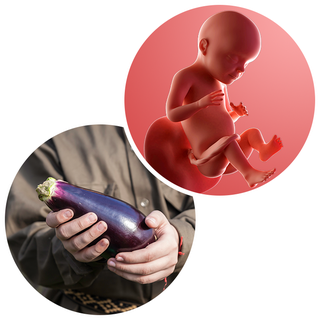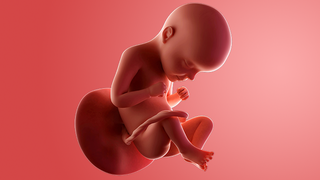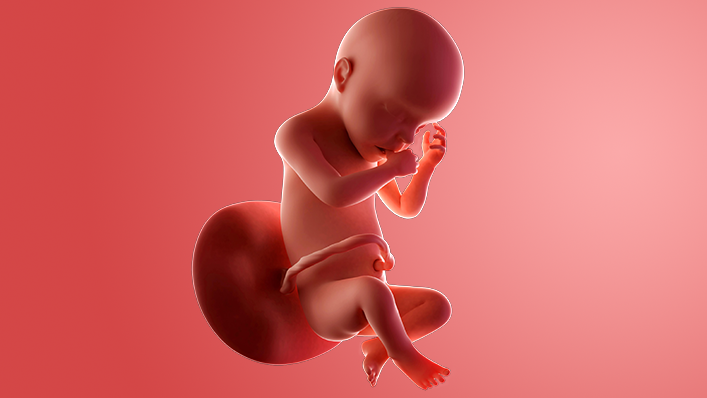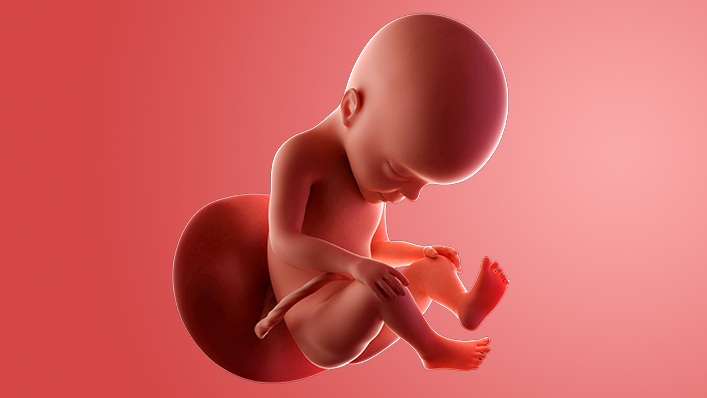What's happening in my body?
You may be getting a bit of heartburn and indigestion. That's down to your growing baby and hormones affecting your digestive system.
Your back will also be under strain, due to the extra weight you're carrying around. Your joints and ligaments will also be looser than usual.
Your ankles, feet and face could be puffing out a bit, particularly when it's hot.
This is probably due to water retention, but get it checked out, just in case it's pre-eclampsia. This is a condition where you may feel perfectly well, but then your blood pressure can get dangerously high, very quickly.
Rest can help with a lot of your symptoms, so make sure you get lots of it – but if you are worried about anything at all, talk to your midwife or doctor, or call NHS 111.
RSV vaccination
RSV (respiratory syncytial virus) is a common virus which can cause a lung infection in small babies called bronchiolitis. This condition can make it hard for your baby to breathe and to feed.
The NHS recommends having the RSV vaccination at around week 28. It can be given later, right up until you go into labour. The vaccination can reduce the risk of getting severe bronchiolitis by 70% in your baby's first 6 months of life.
The immunity that you get will be passed on to your baby through the placenta and then offer protection from the day they are born.
Have you had your whooping cough jab?
The whooping cough vaccination is usually offered to pregnant women at around week 20 but you can have it from week 16 to week 32.
Whooping cough is on the rise – but you can protect your baby from this dangerous condition by having a vaccination. If you have not had it yet, speak to your midwife or a GP.
Read more about whooping cough vaccination in pregnancy on NHS.UK.
Three ways to bust germs
Make sure you know about some of the harmful infections in pregnancy so you can do your best to avoid them.
Here are 3 ways you can protect your unborn baby:
- Wash your hands regularly with soap and water for at least 20 seconds, particularly if you're in contact with children or nappies, as they could carry a virus called CMV (cytomegalovirus).
- If you have a cat, wear gloves when emptying the cat litter tray, or ask someone else to deal with it. Cat poo can contain a bug that causes the dangerous toxoplasmosis infection. You should also wear gloves when gardening, in case you come into contact with animal poo.
- If you have not had chickenpox, let your doctor or midwife know if you come into contact with anyone who could be infectious. The disease can be spread from 2 days before spots appear until they have all formed scabs – usually 5 days after spots appeared. Avoid being around anyone with chickenpox until they have no new blisters or moist crusts on their spots.
Coronavirus (COVID-19)
If you're worried about COVID-19, have a look at the guidance from Royal College of Obstetricians and Gynaecologists on coronavirus and pregnancy.
Nosebleeds
Nosebleeds are common in pregnancy due to hormonal changes, and they can even strike when you're asleep.
Here's what you can do:
- sit or stand up – do not lie down
- pinch your nose just above your nostrils for 10 to 15 minutes
- lean forward and breathe through your mouth
- put an icepack (or a bag of frozen peas wrapped in a tea towel) at the top of your nose
3rd trimester pregnancy symptoms (at 28 weeks)
You may start getting new symptoms now, such as nosebleeds and indigestion.
Your signs of pregnancy could also include:
- sleeping problems (week 19 has information about feeling tired)
- stretch marks (read about week 17 has information on stretch marks)
- swollen and bleeding gums (week 13 has information about gum health during pregnancy)
- pains on the side of your baby bump, caused by your expanding womb ("round ligament pains")
- piles (week 22 has information on piles)
- headaches
- backache
- nosebleeds
- indigestion and heartburn (week 25 has information on digestive problems)
- bloating and constipation (week 10 has information on bloating)
- leg cramps (week 20 has information on how to deal with cramps)
- feeling hot
- dizziness
- swollen hands and feet
- urine infections
- vaginal infections (week 15 has information on vaginal health)
- darkened skin on your face or brown patches – this is known as chloasma or the "mask of pregnancy"
- greasier, spotty skin
- thicker and shinier hair
You may also experience symptoms from earlier weeks, such as:
- mood swings (week 8 has information on mood swings)
- morning sickness (week 6 has information on dealing with morning sickness)
- weird pregnancy cravings (week 5 has information on pregnancy cravings)
- a heightened sense of smell
- sore or leaky breasts (week 14 has information on breast pain) – a white milky pregnancy discharge from your vagina and light spotting (seek medical advice for any bleeding)
What does my baby look like?
Your baby, or foetus, is around 37.6cm long from head to heel. That's approximately the size of an aubergine.
Your baby's heart rate is changing all the time. Around week 5 or 6, when a baby's heart is first detectable, it is around 110 beats per minute (bpm). Then it goes up to around 170 bpm in week 9 and 10.
Now, it's slowed down to around 140 bpm and it will be around 130 bpm at birth.
That's still a lot faster than your heart rate, which will be around 80 to 85bpm. This is partly because babies' hearts are so small that they cannot pump much blood, but they can make up for this by going faster. It also helps to keep them warm.
Your baby's heart can be heard through a stethoscope. Someone else might be able to hear it by putting an ear to your pregnant belly – give it a go, but it's tricky finding the right spot.

Action stations
It's time to work out where your baby will sleep, and it's best to do this sooner, rather than later, before you start running out of energy.
Your baby will spend a lot of time in a cot, so make sure it's safe. If you're buying a new cot, look for the British Standard mark BS EN 716-1.
Read more about what you need for your baby.
This week you could also...
More in week-by-week

Week 29
Are you feeling excited? Or nervous? Or maybe you're a bit of both. Being pregnant stirs up all kinds of emotions.
More in week-by-week guide to pregnancy


